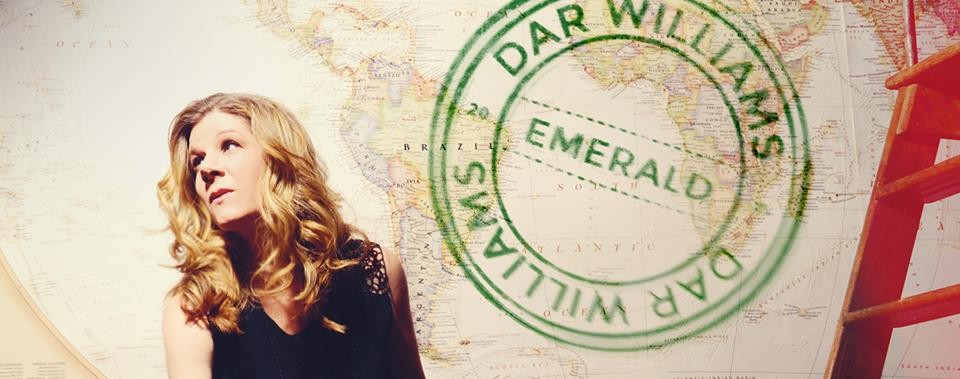Dar Williams’ music professes a great deal of heart; there’s little doubt for the listener that this songwriter sees and feels keenly, and wants to communicate her observations and conclusions.
On her most recent release, and my first brush with her since 1996’s ‘Mortal City’, the most noticeable change is in Williams’ voice which seems to have acquired more depth over the years. Other than that, she is still capable of producing affecting narratives and emotional connections. There’s nothing here of the significant strength of ‘When I Was A Boy’ or the major length and scope of ‘Mortal City’ (the song) but there are still some lovely moments.
Williams is at her strongest when there’s more behind her; there’s a number of sparser arrangements on ‘Emerald’ and a couple of them work out ok despite some flaws, but others fail to grab the attention. Piano-led lament ‘New York is a Harbor’ does well to evoke the historic struggle and glory of the Big Apple. It’s at once jazz-tinged, elegiac, regretful; wistfully understanding how it all works: “we cheer for the hardluck Joe on pay-day, the dancing girl when she gets to Broadway, the worker’s lunch on a cross-beam in the sky.” ‘Girl of the World’ is a timely, gentle tribute to women and girls taking a stand for themselves, each other, and causes: “to those who drum and shout and speak your minds, for what you’ve all seen, I am calling”. But elsewhere ‘Weight of the World’ finally fails to deliver, ‘Emerald’ is so stately that you can easily drift off and ‘Empty Plane’ takes everyday observations too far and slips into the trite recounting of a coffee order.
‘Something to Get Through’ and ‘Here Tonight’ are both perfectly serviceably up-tempo, poppy folk, but there are four tracks that give this album its weight. One of them, ‘Slippery Slope’, bucks the trend: it’s a soft, shuffling examination of marriage, duetted by Dar and country-singer Jim Lauderdale. Yes, it features a deal of cliche (the man as a “horses’s ass in a dancing class, apologising and knocking everybody down”) but it feels honestly-crafted, and warm-hearted, and it’s true. ‘Johnny Appleseed’ – a better than the original cover of the Joe Strummer and The Mescaleros song – is an environmental, cautionary sing-along, and ‘FM Radio’ is pure cheeseball excitement. It’s super-fun and its enthusiasm is infectious: exhorting us to remain optimistic about the fact that good will out, and anyone can be anything, with the line “remember Bruce Springsteen divorced a model and married a musician !”
But the stand-out track for me is old-fashioned band-of-friends narrative, ‘Mad River’. It’s a song that practically drips autumn and fractured sunlight. “It was the summertime of the boys and the search for the mark of men/heading out to the tall rocks knowing this could be the end/when they cheered/when you break to the surface and you do it all over again/jumping in the Mad River.” The tale of Ron (“a friend and a brother and the Golden One”) is a sad story of the gradual wrecking of a life, from the hijinks of youth (“he’d drop down, from the bottom of the covered bridge when the day was done”) to illness, takeovers, and repeated lay-offs in the America of Enron and Co. It’s the mark of good writing that you exit the song knowing Ron and his friends and family – you can picture them, you’ve lived some of their life, and you feel some of what they have felt. This is the kind of writing that makes Dar Williams worth listening to.














No Comment